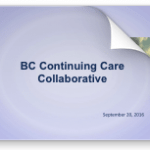On September 20, 2016, the inaugural BC Continuing Care Collaborative took place at the SFU Morris J. Wosk Centre for Dialogue. The BC Care Providers Association (BCCPA), in partnership with the Ministry of Health, brought together over 150 stakeholders from across the continuing care sector to turn ideas into actions. This event concludes a public consultation process that began in May which also included an online survey that received over 750 responses.You can read the Collaborative agenda and our list of attendees.
 Dr. Darryl Plecas, Parliamentary Secretary to the Minister of Health for Seniors and MLA for Abbotsford South representing the Government of British Columbia, provided the day’s keynote address and participated in the Collaborative. Dr. Plecas is tasked by Minister of Health Terry Lake with conducting a residential care review.
Dr. Darryl Plecas, Parliamentary Secretary to the Minister of Health for Seniors and MLA for Abbotsford South representing the Government of British Columbia, provided the day’s keynote address and participated in the Collaborative. Dr. Plecas is tasked by Minister of Health Terry Lake with conducting a residential care review.
This historic event brought together representatives from the BC government, labour, health authorities, the seniors advocate, academia, nurses, LPNs, doctors, NGOs, trade associations, family members of seniors in care, as well the voices of seniors themselves.
The subject matter of the Collaborative was based upon two major White Papers produced by BCCPA to outline a number of potential options to improve the sustainability of the continuing care sector, as well as to foster innovation. In addition to publishing the White Papers, BCCPA sought input from those receiving care, our members, key partners, and a wide range of other stakeholders on many of the options and ideas presented in the papers.
Slide Presentations
The slide presentations of our speakers are all available here in the order they were discussed at the Collaborative. Refer to them as you watch the Facebook live video streams.

![]() The entire day was recorded via Facebook live. Look for them tagged with #BCC3 in the videos section of our BC Care Providers Association page.
The entire day was recorded via Facebook live. Look for them tagged with #BCC3 in the videos section of our BC Care Providers Association page.
The BC Continuing Care Collaborative was made possible in part through the generous support of our knowledge partner McKesson Canada.












